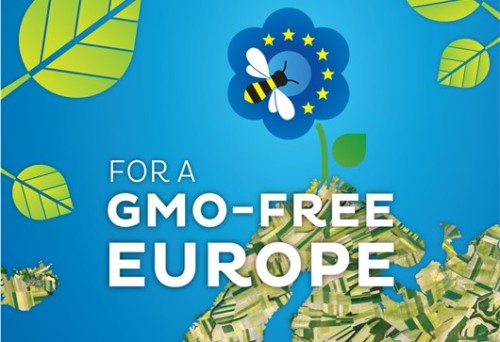
Image from Sustainable Pulse
“Waiter, waiter, where is the genetically modified food on the menu?”
Do you know anyone clamouring to eat genetically modified (GM) food?
One of the many reasons I voted Remain in the 2016 referendum was because the European Union (EU) largely protects its citizens against this unproven technology.
EU – a buffer against GM
Look, I am not saying the European Union (EU) is perfect. It needs reform. Obvs.
But, in some areas, it has acted on my behalf.
The EU has also largely prevented the commercial growing of GM crops, only giving permission for one GM crop to be grown.
In addition, European consumers can make informed choices about whether or not to eat GM thanks to the EU insisting that GM ingredients are labelled (unlike in North America, where its citizens are now campaigning for GM labelling).
(Sadly, the EU does not label dairy and meat from animals fed on GM, but that is another story, and one that anti-GM campaigners are working on.).
GM is not popular in Europe. Over half of EU countries officially ban GM.
And British citizens have resoundingly rejected it.
UK governments – Labour and Conservative – are, however, pro-GM.
So far, the EU has prevented our green and pleasant land being turned into one giant biotech experiment.
The question is: without the EU, how will our GM-free future fare?
Brexit uncertainty
The pack of cards is in the air.
The terms of Brexit have yet to be set in agriculture, as in all other areas.
Uncertainty creates opportunity.
Food and farming charities and organisations are wholeheartedly seizing this opportunity to lobby for sustainable farming.
However, the seed and chemical corporates are also seizing this opportunity, only in their case, to lobby for their profit-driven biotech future.
And these multinationals have huge financial resources and well-oiled lobbying machines at their disposal.
In addition, a recent merger of Monsanto and Bayer increases their voracious drive for new markets.
To whom will our government listen, the sustainable food and farming groups, or the multinational corporations?
Hmnnn, I wonder.
Worrying signs
What will the UK government do?
The UK government has signalled it will not be following the EU’s Common Agricultural Policy (CAP). That is good – it needs reform.
However, one of CAP’s merits is that it is strongly against GM.
In a parliamentary written answer in October 2016, agricultural minister George Eustice said that “as part of preparations for the EU exit, the Government is considering possible future arrangements for the regulation of genetically modified organisms…Government “policy and regulation in this area” should be “science-based and proportionate”.
Possible future arrangements for regulation? From a government in favour of deregulation? Uh oh.
Proportionate? GM Watch warns this may be a weasel word for “weaker.”
Forgive my cynicism, but post-Brexit, I fear we are girding our loins for another fight to protect our fields and food from GM.
Risks of GM
If the UK voted Brexit to strengthen sovereignty, then GM means a potential loss of food sovereignty.
Why? When a biotech seed company genetically modifies a seed, it gives the company the legal right to patent it. Whoever owns the seed (via a patent), controls our food supply.
Yet seeds know no boundaries and naturally cross-pollinate. When a GM seed lands unlicensed on a farmer’s field, the farmer can be sued.
“The agricultural giant Monsanto has sued hundreds of small farmers in the United States in recent years in attempts to protect its patent rights on genetically engineered seeds”
Half of all seeds worldwide are now owned by a handful of multinational chemical companies, and their seeds are becoming increasingly expensive.
According to Charles Benbrook, chief scientist at the US Organic Center: “The $70 per bag price set for [GM] RR2 soybeans in 2010 is twice the cost of conventional seed and reflects a 143% increase in the price of GM seed since 2001”.
GM ties farmers into expensive arrangements because they have to buy the proprietary pesticide that goes with the GM seed engineered to not die when sprayed with these proprietary pesticides.
GM alters the genetic make-up of seeds – a GM seed is not the same as its non-GM counterpart.
We do not know if GM food is safe or healthy to eat.
There are rising incidences of allergies in the US where, due to the lack of labelling, consumers have unwittingly consumed GM for decades. There is a growing body of studies which suggests GM food can be harmful.
Organic standards ban genetically modified ingredients from every stage of production – one of the many reasons I chose organic food.
Citizens, be vigilant!
So, fellow real food lovers, I beg you, get informed about the risks of GM.
What do you think?

